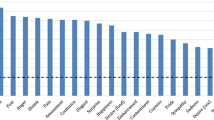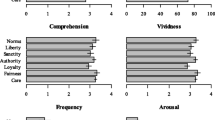Abstract
Moral experience comes in many flavors. Some philosophers have argued that there is nothing common to the many forms moral experience can take. In this paper, I argue that close attention to the phenomenology of certain key emotions, combined with a clear distinction between essentially and accidentally moral experiences, suggests that there is a group of (essentially) moral experiences which in fact exhibits significant unity.
Similar content being viewed by others
Notes
Personally, I find quite compelling Husserl’s notion that perceptual experience is distinctive in presenting its objects in the flesh (‘in persona,’ as he writes). Seeing the tree in my backyard is phenomenally dissimilar to thinking about the same tree, inter alia, insofar as it presents the tree ‘in the flesh.’ This appears to mean that while both the thinking and the seeing represents the tree, the seeing represent the tree as in some sense present here at now, whereas the thought does not (for more on how to unpack in-the-flesh, see Kriegel 2019).
I am assuming here that pain has a(n intentional) object. This used to be a daring assumption, but in recent philosophical discussions of pain and pleasure it has become orthodoxy. There is of course lively debate over what the distinctive objects of pain are, but on my view pain does not have distinctive objects. What is distinctive of pain is rather its attitudinal character.
Manela (2016) presents a pair of different distinctions between gratitude and appreciation, but he uses the term ‘appreciation’ to denote a different kind of mental state, what he calls ‘propositional gratitude,’ such as we would report with a the locution grateful that. I have no doubt that the mental state Manela is interested in is a legitimate referent of ‘appreciation’ – more on this toward the end of this section. It is just a different mental state from the one I am interested in.
This kind of projective identification certainly appears to be much more pervasive for anger than for gratitude. The contingent causes of this asymmetry are something we can only speculate about. But the upshot is that anger about ‘allocentric states of affairs,’ so to speak, is in fact quite common. All the same, it is notable that this kind of identification is necessary for our ability to feel anger about matters that do not remotely concern us, whereas indignation does not require any such identification. That said, we should keep in mind that even in the absence of any identification there is substantial phenomenal overlap between anger and indignation, which makes labeling tricky – more on that soon.
Some second-personal approaches to morality treat resentment as a paradigmatically moral emotion, despite its lack of detachment from the subject’s own involvement in the situation. But first, I think it is a limitation of these approaches that they cannot capture the “objective pretensions” of moral experience, and secondly, although resentment is often moral, it is unclear to me that it has to be moral. My corrupt referee seems to me to resent me because I got that grant at her expense. In getting this grant at her expense, I have harmed her, but I have not wronged her.
It is interesting to think about what the distinctive attitudinal character of guilt might be. On the face of it, guilt represents-as-morally-blameworthy just as indignation does, but does so in a first-personal way whereas indignation is third-personal. One interesting question here is whether the first-personal/third-personal distinction belongs properly in the attitude or content of these emotions – which in turn may have interesting implications for the structure of the realm of moral experience.
Work for this paper was supported by the French National Research Agency’s grant ANR-17-EURE-0017, as well as by grant 675,415 of the European Union’s Horizon 2020 Research and Innovation program and a Bessel Research Award from Germany’s Alexander von Humboldt’s Foundation. For comments on a previous draft, I am grateful to Walter Sinnott-Armstrong, Charles Siewert, and two anonymous referees for ETMP. I have also benefited from discussions in a semester-long seminar on the moral emotions at Rice University; I am grateful to the seminar participants, Mustafa Aghahosseini, Christian Blacèt, Anna Giustina, Hitkarsh Kumar, Daniel Pinto, Reuben Sass, and Patricia Thornton.
References
Bommarito N (2017) Virtuous and vicious anger. J Ethics Soc Philos 11(3):1–27
Darwall SL (1977) Two kinds of respect. Ethics 88:36–49
Drummond JJ (2006) Respect as a moral emotion: a phenomenological approach. Husserl Stud 22:1–27
Drummond JJ (2017) Anger and indignation. In: Drummond JJ, Rinofner-Kreidl S (eds) Emotional experiences: ethical and social significance. Rowman & Littlefield, London and New York
Dupré J (1981) Natural kinds and biological taxa. Philos Rev 90:66–90
Gill MB (2008) Variability and moral phenomenology. Phenomenol Cogn Sci 7:99–113
Haidt J, Joseph C (2004) Intuitive ethics: how innately prepared intuitions generate culturally variable virtues Daedalus. Fall 2004:55–66
Kauppinen A (2017) Pride, achievement, and purpose. In: Carter JA, Gordon EC (eds) The moral psychology of pride. Rowman and Littlefield, London
Kriegel U (2015) The varieties of consciousness. Oxford University Press, Oxford and New York
Kriegel U (2019) The perception/cognition divide: one more time, with feelings. In: Limbeck-Lilienau C, Stadler F (eds) The philosophy of perception and observation. De Gruyter, Berlin and Boston
Kriegel U, Timmons MC (2021) The phenomenology of Kantian respect for persons. In: Dean R, Sensen O (eds) Respect: philosophical essays. Oxford University Press, Oxford
Mason M (2003) Contempt as a moral attitude. Ethics 113:234–272
Manela T (2016) Gratitude and appreciation. Am Philos Q 53:281–294
Shweder RA, Much NC, Mahapatra MM, Park L (1997) The “big three” of morality (autonomy, community, and divinity) and the “big three” explanations of suffering. In: Brandt AM, Rozin P (eds) Morality and health. Routledge, New York
Siegel S (2007) How can we discover the contents of experience? Southern J Philos (supplement) 45:127–142
Sinnott-Armstrong W (2008) Is moral phenomenology unified? Phenomenol Cogn Sci 7:85–97
Strawson PF (1962) Freedom and resentment, In his Freedom and Resentment and Other Essays. Oxford University Press, Oxford and New York 2008
Tenenbaum S (2009 )Knowing the Good and Knowing What One is Doing.’ Canadian Journal of Philosophy 39 (supplement): 91–117
Velleman D (1992) The guise of the good. Noûs 26:3–26
Yasenchuk K (1997) Moral Realism and the Burden of Argument. Southern J Philos 35:247–264
Author information
Authors and Affiliations
Corresponding author
Additional information
Publisher’s Note
Springer Nature remains neutral with regard to jurisdictional claims in published maps and institutional affiliations.
Rights and permissions
About this article
Cite this article
Kriegel, U. Indignation, Appreciation, and the Unity of Moral Experience. Ethic Theory Moral Prac 25, 5–19 (2022). https://doi.org/10.1007/s10677-021-10214-3
Accepted:
Published:
Issue Date:
DOI: https://doi.org/10.1007/s10677-021-10214-3




